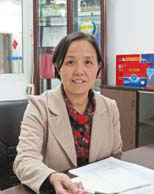Riding the crest of success
Updated: 2013-01-14 10:00
By Zhang Haizhou (China Daily)
|
||||||||
Tech edge pays off for entrepreneur
"It's hard to fly in the sky, but it's even more tough to dive deep into the sea," says an exasperated Lin Xiufen after spending eight years unlocking the mysteries of the oceans.
|
 |
|
Lin Xiufen, general manager of Blue Bay Science & Technology Co Ltd. [Photo/China Daily] |
Lin's company Blue Bay is one of the few in China that makes glucosamine capsules, a non-prescription dietary supplement used for treating osteoarthritis symptoms and to help maintain healthy joint cartilage. The capsules are made from high purity sodium (potassium) free glucosamine sulfate harvested from the shells of shellfish like prawn and crab.
Lin says that her company can produce up to 20 tons of pure glucosamine sulfate every year with purity levels in excess of 90 percent compared with the global norms of 80 percent. "It is a high-yield product as a ton of glucosamine can command prices of up to 10 million yuan ($1.6 million; 1.2 million euros)."
Though the returns are high, Lin, in her 40s, says that the initial years were harrowing.
To begin with, high-purity glucosamine was a new research product developed by the Third Institute of Oceanography, under the State Oceanic Administration in Xiamen. Like many other new high-tech products, TIO's glucosamine did not have backers initially and there was an acute funding crunch for commercializing the product.
Eyeing the promising future for the product, Lin set up Blue Bay in 2005 after leaving a high-paid director-level job at a state-owned financial firm. She says that to generate the seed capital for the venture, she had to sell most of the property she owned. "To date, I have invested nearly 60 million yuan in the project."
Even then, it took nearly four years for the company to start making glucosamine. "We rented laboratories and equipment for making the first batch of products, a few tons of glucosamine capsules, in 2009. Since then we have managed to make some profits," Lin says.
The lack of funds was such a pressing problem in the initial years that there was even an occasion when the company had just 10,000 yuan in its coffers, making it tough even to pay the salaries of employees.
The turning point came when a healthcare employee in Xiamen told Lin over lunch to get in touch with officials from the General Administration of Sport of China and seek their help to promote and sell the products.
"I decided to take his advice and left for Beijing a few hours later. I did not know anyone at the GASC then," Lin says.
Through the help of her former schoolmates, Lin managed to find a retired table tennis player and persuaded him to take the glucosamine capsules to combat osteoarthritis.
That move paid off and soon Lin became a well-known name on the sports circuit in China and had an ensemble list of athletes and several former footballers that were using her products. The company's products are now sold in more than 30 provinces and 200 cities across China.
Lin says she is now looking to take her company to even greater heights and increase production step by step as demand increases in China. Blue Bay has about 80 employees, who work in a 5,000-square-meter factory.
Luckily for Lin, the growth phase of her company coincided with the blue economy taking off in China.
With an eye on the future, the company plans to set up a new facility with an annual production capacity of 200 tons by 2014.
zhanghaizhou@chinadaily.com.cn

 Li Na on Time cover, makes influential 100 list
Li Na on Time cover, makes influential 100 list
 FBI releases photos of 2 Boston bombings suspects
FBI releases photos of 2 Boston bombings suspects
 World's wackiest hairstyles
World's wackiest hairstyles
 Sandstorms strike Northwest China
Sandstorms strike Northwest China
 Never-seen photos of Madonna on display
Never-seen photos of Madonna on display
 H7N9 outbreak linked to waterfowl migration
H7N9 outbreak linked to waterfowl migration
 Dozens feared dead in Texas plant blast
Dozens feared dead in Texas plant blast
 Venezuelan court rules out manual votes counting
Venezuelan court rules out manual votes counting
Most Viewed
Editor's Picks

|

|

|

|

|

|
Today's Top News
Boston bombing suspect reported cornered on boat
7.0-magnitude quake hits Sichuan
Cross-talk artist helps to spread the word
'Green' awareness levels drop in Beijing
Palace Museum spruces up
First couple on Time's list of most influential
H7N9 flu transmission studied
Trading channels 'need to broaden'
US Weekly

|

|







